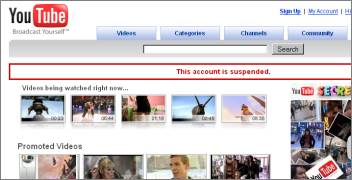It’s worth noting that the Viacom lawsuit against YouTube makes little sense in light of the DMCA. For the few TechLiberation readers unfamiliar with the DMCA, that’s because the law grants YouTube, and other sites with unedited user-generated content “safe harbor.” So long as YouTube honors requests to take-down material that is claimed to be protected under copyright, it isn’t liable for that material being posted in the first place.
Google is following the DMCA and even going beyond its legal obligations to protect copyright.
In fact, YouTube suspended CEI’s account—wiping out all of our videos—based on a disputed 7 seconds of footage used in one of our videos. This was a very severe punishment and thankfully our account was reinstated after we were able to argue against the merits of the take-down. For those who do violate copyright, permanent suspension is a harsh punishment—so long as the account in questions isn’t a throw-away. Google is going well beyond the required take-down in this instance.

Yet, one of the complaints Viacom has about YouTube is that it hasn’t implemented software that would automatically weed out some copyrighted material produced by the entertainment industry—something that, again, would be above and beyond their legal obligations. YouTube planned to implement this software last year, but has failed to roll it out to the site. Viacom can complain about this delay, but not in the legal sense. Viacom simply has no grounds for a legal complaint unless they can somehow argue that the safe harbor provision of the DMCA is somehow invalid. A copyright lawyer might be able to suggest to us how such a thing could be done, if possible.
If Viacom means to show that the DMCA is in conflict with other copyright law and therefore the DMCA should be abandon or at least rewritten, it makes one wonder what a new system would look like. The current system of free posting and honoring take-downs seems to work well. It allows users to upload 10 hours of content per minute to YouTube—most of it seems to be kittens doing amusing things, not pre-lease episodes of 24—while still honoring copyright through take down. This has created a whole new medium for self-expression, expanding the media market in ways we are still trying to understand.
Were another balance to be struck, one that place the burden of policing content on YouTube, we would see this explosion of user-generated content fizzle out…or at least, like I said in my previous post, on YouTube.
Another balancing of the concerns of video sites and content owners—this one more heavily favoring content owners—would create significant barriers to video sharing and drive many from the market. Even so, user-generated video won’t be going away and infringement will continue in different forms. So again I’m forced to ask, “What is Viacom getting out of this?”

 The Technology Liberation Front is the tech policy blog dedicated to keeping politicians' hands off the 'net and everything else related to technology.
The Technology Liberation Front is the tech policy blog dedicated to keeping politicians' hands off the 'net and everything else related to technology.